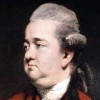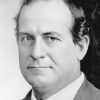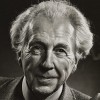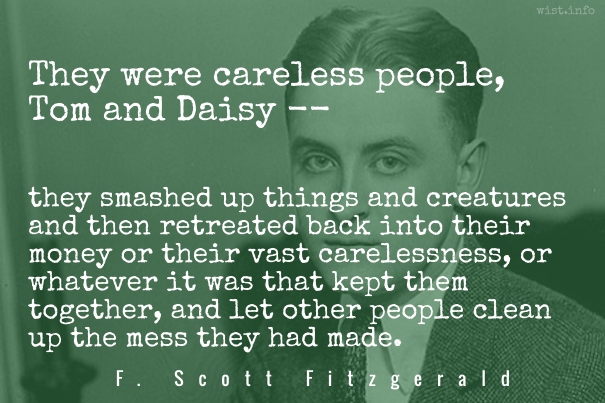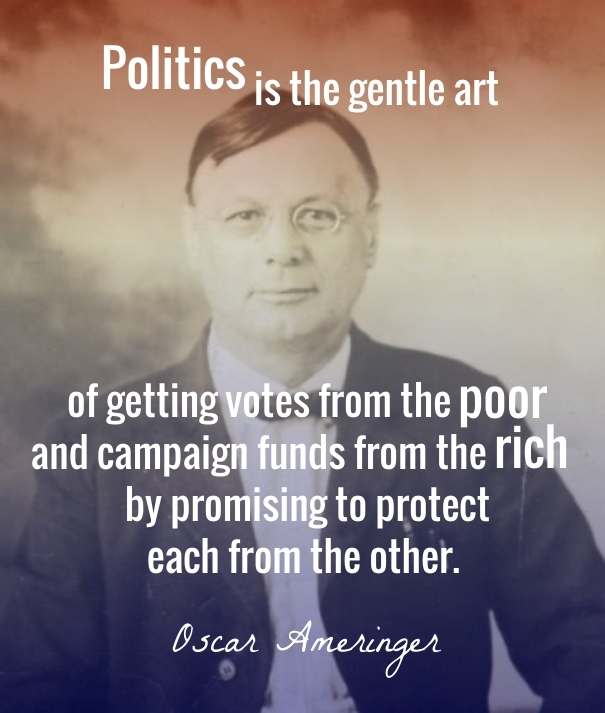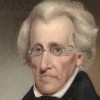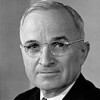Yet it is not on account of food or clothing that wealth is sought by most. Some device has been concocted by the devil, suggesting innumerable spending opportunities to the wealthy, so that they pursue unnecessary and worthless things as if they were indispensable, and no amount is sufficient for the expenditures they contrive.
[Ἀλλ’ οὐ γὰρ ἱματίων ἕνεκεν οὐδὲ τροφῶν ὁ πλοῦτός ἐστι τοῖς πολλοῖς περισπούδαστος, ἀλλά τις ἐπινενόηται μεθοδεία τῷ διαβόλῳ, μυρίας τοῖς πλουσίοις δαπάνης ἀφορμὰς ὑποβάλλουσα, ὥστε τὰ περιττὰ καὶ ἄχρηστα ὡς ἀναγκαῖα σπου δάζεσθαι, μηδὲν δὲ αὐτοῖς ἐξαρκεῖν πρὸς τὴν τῶν ἀναλωμάτων ἐπίνοιαν.]
Basil of Caesarea (AD 330-378) Christian bishop, theologian, monasticist, Doctor of the Church [Saint Basil the Great, Ἅγιος Βασίλειος ὁ Μέγας]
“To the Rich [Ὁμιλία πρὸς τοὺς πλουτούντας],” sermon (c. 368) [tr. Schroeder (2009)]
(Source)
Quotations about:
wealthy
Note not all quotations have been tagged, so Search may find additional quotes on this topic.
A fine is a bribe paid by a rich man to escape the lawful penalty of his crime. In China such bribes are paid to the judge personally. In America they are paid to him as agent for the public. But it makes no difference to the men who pay them, nor to the men who can’t pay them.
H. L. Mencken (1880-1956) American writer and journalist [Henry Lewis Mencken]
A Little Book in C Major, ch. 4, § 7 (1916)
(Source)
Variants:
FINE. A bribe paid by a rich man to escape the lawful penalty of his crime. In China such bribes are paid to the judge personally; in America they are paid to him as agent for the public. But it makes no difference to the men who pay them -- nor to the men who can't pay them.
[A Book of Burlesques, "The Jazz Webster" (1924)]
Fine -- A bribe paid by a rich man to escape the lawful penalty of his crime. In China such bribes are paid to the judge personally; in America they are paid to him as agent for the public. But it makes no difference to the men who pay them -- nor to the men who can’t pay them.
[Chrestomathy, ch. 30 "Sententiae" (1949)]
The poor have the same basic pleasures of the rich, and the rich will always resent it.
Mignon McLaughlin (1913-1983) American journalist and author
The Neurotic’s Notebook, ch. 1 (1963)
(Source)
Thirst, hunger, and nakedness, are positive evils: but wealth is relative; and a prince who would be rich in a private station, may be exposed by the increase of his wants to all the anxiety and bitterness of poverty.
Edward Gibbon (1737-1794) English historian
The History of the Decline and Fall of the Roman Empire, ch. 61 (1776-88)
(Source)
You seem to have great possessions! How else can this be, but that you have preferred your own enjoyment to the consolation of the many? For the more you abound in wealth, the more you lack in love.
[ἀλλὰ μὴν φαίνῃ ἔχων κτήματα πολλά. Πόθεν ταῦτα; ἢ δῆλον ὅτι τὴν οἰκείαν ἀπόλαυσιν προτι μοτέραν τῆς τῶν πολλῶν παραμυθίας ποιούμενος. Ὅσον οὖν πλεονάζεις τῷ πλούτῳ, τοσοῦτον ἐλλείπεις τῇ ἀγάπῃ.]
Basil of Caesarea (AD 330-378) Christian bishop, theologian, monasticist, Doctor of the Church [Saint Basil the Great, Ἅγιος Βασίλειος ὁ Μέγας]
“To the Rich [Ὁμιλία πρὸς τοὺς πλουτούντας],” sermon (c. 368) [tr. Schroeder (2009)]
(Source)
In C. Paul Schroeder, ed., Saint Basil on Social Justice (2009).
It takes a grate deal of money tew make a man ritch, but it don’t take but little virtew.
[It takes a great deal of money to make a man rich, but it doesn’t take but little virtue.]
Josh Billings (1818-1885) American humorist, aphorist [pseud. of Henry Wheeler Shaw]
Everybody’s Friend, Or; Josh Billing’s Encyclopedia and Proverbial Philosophy of Wit and Humor, ch. 144 “Affurisms: Gnats” (1874)
(Source)
We know that the poor are distressed by their many wants, and that nobody relieves them; but if the rich feel resentment, it is at lacking any single thing, or meeting with resistance from a single person.
[On sait que les pauvres sont chagrins de ce que tout leur manque, et que personne ne les soulage; mais s’il est vrai que les riches soient colères, c’est de ce que la moindre chose puisse leur manquer, ou que quelqu’un veuille leur résister.]
Jean de La Bruyère (1645-1696) French essayist, moralist
The Characters [Les Caractères], ch. 6 “Of Gifts of Fortune [Des Biens de Fortune],” § 48 (6.48) (1688) [tr. Stewart (1970)]
(Source)
(Source (French)). Alternate translations:
The Poor are troubled that they want all things, and no body comforts them. The Rich are angry that they can want the least thing, or that any one would resist them.
[Bullord ed. (1696)]
The Poor are troubled that they want every thing, and no body comforts them. The Rich are angry that they should want the least thing, or that any one should oppose them.
[Curll ed. (1713)]
The Grief of the Poor is, that they want all Things, and no body comforts them. The Rich are angry if they want the least Thing, is any one contradict or oppose them.
[Browne ed. (1752)]
It is well known that the poor are sad because they want everything and nobody comforts them; but if it be true that the rich are irascible, it is because they may want the smallest thing, or that some one might oppose them.
[tr. Van Laun (1885)]
With tread imperial, impartial pallid Death
knocks at the doors of cottages and palaces. [Pallida mors æquo pulsat pede pauperum tabernas
Regumque turres.]Horace (65-8 BC) Roman poet and satirist [Quintus Horacius Flaccus]
Odes [Carmina], Book 1, # 4, l. 13ff (1.4.13-14) (23 BC) [tr. Alexander (1999), “To Lucius Sestius”]
(Source)
(Source (Latin)). Alternate translations:
Death knocks as boldly at the Rich mans dore
As at the Cottage of the Poore,
[tr. Fanshaw (1666), "To L. Sextius, a Consular Man"]
With equal foot, Rich friend, impartial Fate
Knocks at the Cottage, and the Palace Gate.
[tr. Creech (1684), "He adviseth his Friend to live merrily"]
Pale Death, impartial, walks his round: he knocks at cottage-gate
And palace-portal.
[tr. Conington (1872)]
Pale death knocks at the cottages of the poor, and the palaces of kings, with an impartial foot.
[tr. Smart/Buckley (1853), "To Sextius"]
Death comes alike to all, — to the monarch's lordly hall,
Or the hovel of the beggar, and his summons none shall stay.
[tr. Martin (1864), "To Sestius"]
But all the while, with equal step, pale Death strides on unpausing,
Knocks at thé lowly shed and regal tower.
[tr. Bulwer-Lytton (1870), "To Lucius Sestius"]
Pale death, with impartial step, knocks at the hut of the poor and the towers of kings.
[E.g. (1893)]
The kingly tower alike
And pauper's hut pale Death will strike.
[tr. Gladstone (1894), "To the Rich Sextius"]
Pale Death with foot impartial knocks at poor men's dwellings.
And tow'rs of monarchs.
[tr. Phelps (1897), "To Sestius"]
Pale death with foot impartial strikes at the huts of paupers and
Kings' towers.
[tr. Garnsey (1907), "To Sestius"]
With equal foot pale Pluto knocks at hovels of the poor,
And at the tyrant's towers
[tr. Marshall (1908), "Spring"]
Pale Death with foot impartial knocks at the poor man’s cottage and at princes’ palaces.
[tr. Bennett (Loeb) (1912), "Spring's Lesson"]
Marching with step impartial, Death's pale Presence raps its call
At doors of rich and poor alike.
[tr. Mills (1924)]
Hold! Pale Death, at the poor man's shack and the pasha's palace kicking
Impartially, announces his arrival.
[tr. Michie (1964)]
Death raps his bony knuckles, bleached,
Indifferent, on any man’s door, a palace or a hut.
[tr. Raffel (1983)]
Revenant white-faced Death is walking not knowing whether
He's going to knock at a rich man's door or a poor man's.
[tr. Ferry (1997)]
Pale death knocks with impartial foot, at the door of the poor man’s cottage,
and at the prince’s gate.
[tr. Kline (2015), "Spring"]
Nothing more clearly shows how little God esteems his gift to men of wealth, money, position and other worldly goods, than the way he distributes these, and the sort of men who are most amply provided with them.
[Rien ne fait mieux comprendre le peu de chose que Dieu croit donner aux hommes, en leur abandonnant les richesses, l’argent, les grands établissements et les autres biens, que la dispensation qu’il en fait, et le genre d’hommes qui en sont le mieux pourvus.]
Jean de La Bruyère (1645-1696) French essayist, moralist
The Characters [Les Caractères], ch. 6 “Of Gifts of Fortune [Des Biens de Fortune],” § 24 (6.24) (1688) [tr. Stewart (1970)]
(Source)
See Alexander Pope.
(Source (French)). Alternate translations:
Nothing makes us better comprehend what little things God thinks he bestows on Mankind, when he suffers 'em to abound in Riches, Gold, Settlements, Stations, and other advantages, than the dispensations he makes of them, and the sort of men who are best provided.
[Bullord ed. (1696)]
Nothing makes us better comprehend what little things God thinks he bestows on Mankind, in suffering 'em to abound in Riches, Mony, great Preferments, and other Advantages, than the Distribution he makes of 'em, and the sort of Men who are best provided.
[Curll ed. (1713)]
Nothing makes us better understand what trifling things Providence thinks He bestows on men in granting them wealth, money, dignities, and other advantages, than the manner in which they are distributed and the kind of men who have the largest share.
[tr. Van Laun (1885)]
“But whom do I treat unjustly,” you say, “by keeping what is my own?” Tell me, what is your own? What did you bring into this life? From where did you receive it? It is as if someone were to take the first seat in the theater, then bar everyone else from attending, so that one person alone enjoys what is offered for the benefit of all in common — this is what the rich do. They seize common goods before others have the opportunity, then claim them as their own by right of preemption. For if we all took only what was necessary to satisfy our own needs, giving the rest to those who lack, no one would be rich, no one would be poor, and no one would be in need.
[Καὶ ποῖον, λέγει, ἀδικῶ, μὲ τὸ νὰ κρατῶ γιὰ τoν ἐαυτόν μου αὐτὰ ποῦ μου ἀνήκουν; Ποία, εἰπέ μου, εἶναι αὐτὰ ποῦ σου ἀνήκουν; Ἀπὸ ποῦ τὰ ἔλαβες, καὶ τὰ ἔφερες στὴν ζωὴν αὐτήν; Ὅπως ἀκριβῶς κάποιος ποὺ εὑρίσκει στὸ θέατρο θέση μὲ καλὴν θέαν, ἐμποδίζει ἔπειτα τοὺς εἰσερχομένους, θεωρώντας ὡς ἰδικὸ τοῦ αὐτὸ ποὺ προορίζεται γιὰ χρῆσιν κοινήν, ἔτσι εἶναι καὶ οἱ πλούσιοι. Ἀφοῦ ἐκυρίευσαν ἐκ τῶν προτέρων τα κοινὰ ἀγαθά, τὰ ἰδιοποιοῦνται ἁπλῶς ἐπειδὴ τὰ ἐπρόλαβαν. Ἐὰν ὁ καθένας ἐκρατοῦσε ἐκεῖνο ποὺ ἀρκεῖ γιὰ τὴν ἱκανοποίηση τῶν ἀναγκῶν του, καὶ ἄφηνε τὸ περίσσευμα σ’ αὐτὸν ποὺ τὸ χρειάζεται, κανεὶς δὲν θὰ ἦταν πλούσιος, ἀλλὰ καὶ κανεὶς πτωχός.]
Basil of Caesarea (AD 330-378) Christian bishop, theologian, monasticist, Doctor of the Church [Saint Basil the Great, Ἅγιος Βασίλειος ὁ Μέγας]
“I Will Tear Down My Barns [καθελῶ μου τὰς ἀποθήκας],” Sermon # 6 [tr. Schroeder (2009)]
(Source)
In C. Paul Schroeder, ed., Saint Basil on Social Justice (2009).
He called to mind all the millionaires he had ever read or heard of; they didn’t seem to get much fun out of their riches. The majority of them were martyrs to dyspepsia. They were often weighed down by the cares and responsibilities of their position; the only people who were unable to obtain an audience of them at any time were their friends; they lived in a glare of publicity, and every post brought them hundreds of begging letters, and a few threats; their children were in constant danger from kidnappers, and they themselves, after knowing no rest in life, could not be certain that even their tombs would be undisturbed. Whether they were extravagant or thrifty, they were equally maligned, and, whatever the fortune they left behind them, they could be absolutely certain that, in a couple of generations, it would be entirely dissipated.
F. Anstey (1856-1934) English novelist and journalist (pseud. of Thomas Anstey Guthrie)
The Brass Bottle, ch. 7 (1900)
(Source)
How far, O rich, do you extend your senseless avarice? Do you intend to be the sole inhabitants of the earth? Why do you drive out the fellow sharers of nature, and claim it all for yourselves? The earth was made for all, rich and poor, in common. Why do you rich claim it as your exclusive right? The soil was given to the rich and poor in common — wherefore, oh, ye rich, do you unjustly claim it for yourselves alone? Nature gave all things in common for the use of all; usurpation created private rights. Property hath no rights. The earth is the Lord’s, and we are his offspring. The pagans hold earth as property. They do blaspheme God.
Ambrose of Milan (339-397) Roman theologian, statesman, Christian prelate, saint, Doctor of the Church [Aurelius Ambrosius]
(Attributed)
Frequently quoted in the early 20th Century in various social justice writings, and in the years since then, but all citations I can find fall back to its inclusion in Upton Sinclair, The Cry for Justice, Book 8 "The Church" (1915) (though it can be found somewhat earlier than that).
Sometimes when a person sees the roguery of poor people and the thievery of people in high positions, he is tempted to regard society as a forest full of robbers, the most dangerous of which are the policemen that are set up to stop the others.
[En voyant quelquefois les friponneries des petits et les brigandages des hommes en place, on est tenté de regarder la société comme un bois rempli de voleurs, dont les plus dangereux sont les archers, préposés pour arrêter les autres.]
Nicolas Chamfort (1741-1794) French writer, epigrammist (b. Nicolas-Sébastien Roch)
Products of Perfected Civilization [Produits de la Civilisation Perfectionée], Part 1 “Maxims and Thoughts [Maximes et Pensées],” ch. 3, ¶ 198 (1795) [tr. Siniscalchi (1994)]
(Source)
(Source (French)). Alternate translations:
Seeing the rogueries of little men and the extortions of the great in office, one is tempted to look upon Society as a wood infested by robbers, the most dangerous being the constables sent to arrest the others.
[tr. Mathers (1926)]
At times, seeing the petty thieveries of the petty, and the robberies of those in office, one is tempted to regard society as a wood full of thieves, of which the most dangerous are the officers set there to arrest the others.
[tr. Merwin (1969)]
Sometimes, when one observes the rogueries perpetuated by petty people and the graft committed by men in office, one is tempted to think of society as a wood infested by thieves, of which the most dangerous are the archers, posted to prevent the others from escaping.
[tr. Pearson (1973)]
There are times when, seeing the nasty tricks people get up to, the gross frauds of high officers, you're tempted to think that you're in a wood infested by thieves, amongst whom the most dangerous are the police, whose purpose is supposed to be that of arresting them.
[tr. Parmée (2003), ¶ 152]
And who can suffer injury by just taxation, impartial laws and the application of the Jeffersonian doctrine of equal rights to all and special privileges to none? Only those whose accumulations are stained with dishonesty and whose immoral methods have given them a distorted view of business, society and government. Accumulating by conscious frauds more money than they can use upon themselves, wisely distribute or safely leave to their children, these denounce as public enemies all who question their methods or throw a light upon their crimes.
William Jennings Bryan (1860–1925) American lawyer, statesman, politician, orator
Speech, Madison Square Garden, New York (1906-08-30)
(Source)
I had hardly thought by asking
For five hundred I’d be tasking
The kindness of a rich old friend like you.
“Practice law,” you said, “it’s healthy,
And it soon will make you wealthy.”
Now, Gaius, tell me “Yes,” not what to do.[Mutua viginti sestertia forte rogabam,
Quae vel donanti non grave munus erat.
Quippe rogabatur felixque vetusque sodalis
Et cuius laxas arca flagellat opes.
Is mihi ‘Dives eris, si causas egeris’ inquit.
Quod peto da, Gai: non peto consilium.]Martial (AD c.39-c.103) Spanish Roman poet, satirist, epigrammatist [Marcus Valerius Martialis]
Epigrams [Epigrammata], Book 2, epigram 30 (2.30) (AD 86) [tr. Nixon (1911), “Neither a Borrower”]
(Source)
"To Caius/Gaius." (Source (Latin)). Alternate translations:
When twenty pounds I'd borrow of a friend,
One, who might give me more, as well as lend;
Blest in his fortune; my companion old;
Whose coffers, and whose purse-strings, crack with gold.
"Turn lawyer, and you'll soon grow rich," he cries:
Give me what I ask, my friend: -- 'tis not advice.
[tr. Hay (1755)]
Of sesterces a score I crave in loan,
Which scarce a boon would honest bounty own.
A fortune-blest old intimate I urge,
Whose gen'rous wealth tyrannic coffers scourge.
"Go, ply the bar: be affluent in a trice."
I ask your aid, my Cay, not your advice.
[tr. Elphinston (1782), Book 5, ep. 31]
I asked Caius to lend me twenty sestertia, a sum which could not weigh heavy on him, even if he had been asked to give and not to lend; for he was my old companion, and hd been fortunate in life; and his chest can scarcely press down his overflowing riches. He replied to me, "You will become wealthy if you will take to pleading causes." Caius! give me what I ask for, I do not ask for advice.
[tr. Amos (1858), "Unseasonable Advice"; ch. 3, ep. 89]
I asked, by chance, a loan of twenty thousand sesterces, which would have been no serious matter even as a present. He whom I asked was an old acquaintance in good circumstances, whose money-chest finds difficulty in imprisoning his overflowing hoards. "You will enrich yourself, was his reply, "if you will go to the bar." Give me, Caius, what I ask: I do not ask advice.
[tr. Bohn's Classical (1859)]
I asked, as it chanced, the loan of twenty thousand sesterces, which, even to a give, would have been no burden. The fact was I asked them of a well-to-do and old friend, and one whose money-chest keeps in control o'erflowing wealth. His answer was, "You will be rich if you plead causes." Give me what I ask, Gaius: I don't ask for advice.
[tr. Ker (1919)]
I chanced to ask a loan -- a hundred, merely;
E'en as a gift that should not task severely
A wealthy friend, and so I asked him, knowing
His pockets bulge with cash over-flowing.
"Go to the Bar," says he, "get rich by pleading" --
'Tis cash, not counsel, Gaius, that I'm needing.
[tr. Pott & Wright (1921)]
I asked you twenty thousand as a loan,
A trifle, had I craved it for my own,
Such claim might ancient friendship well afford
On one whose coffers chid their bursting hoard.
"Plead and you'll make a fortune in a trice."
I want your money, Gaius, not advice.
[tr. Francis & Tatum (1924), ep. 79]
I asked a rich old friend of mine
for a loan of twenty thousand:
No trouble at all for him to give it to me,
he was so loaded. But in answer to my request
he said, "You know what? You want to make money?
Become a lawyer." Look, Gaius:
I asked you for money, not for advice.
[tr. Bovie (1970)]
I happened to ask a Ioan of twenty thousand sesterces, no burdensome present even as a gift. He of whom I asked it was a faithful old friend, he whose coffer whips up his ample wealth. Says he to me: "You'll be a rich man if you plead cases." Give me what I ask, Gaius; I'm not asking advice.
[tr. Shackleton Bailey (1993)]
I need a loan of twenty grand.
Can you lend a helping hand?
We're friends, it's not a huge amount
Against your massive bank account.
But your reply? "Go practice law,
it's easy to get rich, ha-ha!"
So here's a thought on which to chew:
No job advice I asked from you.
[tr. Ericsson (1995)]
I chanced to seek a loan of twenty thousand --
which one could give away and not think twice.
The man I asked, a trusted longtime friend,
whose strongbox whips up riches in a trice,
said, "Be a lawyer. You'll make piles of cash."
I asked for money, Gaius, not advice.
[tr. McLean (2014)]
Why weren’t these problems obvious to the Maya kings, who could surely see their forests vanishing and their hills becoming eroded? Part of the reason was that the kings were able to insulate themselves from problems afflicting the rest of society. By extracting wealth from commoners, they could remain well fed while everyone else was slowly starving. What’s more, the kings were occupied with their own power struggles. They had to concentrate on fighting one another and keeping up their images through ostentatious displays of wealth. By insulating themselves in the short run from the problems of society, the elite merely bought themselves the privilege of being among the last to starve.
Jared Diamond (b. 1937) American geographer, historian, ornithologist, author
“The Ends of the World as We Know Them,” New York Times (1 Jan 2005)
(Source)
The rich know anger helps the cost of living:
Hating’s more economical than giving.[Genus, Aucte, lucri divites habent iram:
Odisse, quam donare, vilius constat.]Martial (AD c.39-c.103) Spanish Roman poet, satirist, epigrammatist [Marcus Valerius Martialis]
Epigrams [Epigrammata], Book 12, epigram 13 (12.13) (AD 101) [tr. Michie (1972)]
(Source)
"To Auctus." Closely parallel to 3.37, to the point where some translations are cross-applied in error. The general interpretation, from Ker, is that "picking quarrels with clients saves you giving them presents."
(Source (Latin)). Alternate translations:
Anger's a kind of gain that rich men know:
It costs them less to hate than to bestow.
[tr. Fletcher (1656)]
Rich men, my friend, by anger know to thrive.
'Tis cheaper much to quarrel, than to give.
[tr. Hay (1755)]
From ire can gainmongers elicit ore.
Fell hate is frugal: love might lavish more.
[tr. Elphinston (1782), 12.68]
Ask you, last night, why Gripus ill behaved?
A well-timed quarrel is a dinner saved.
[tr. Halhead (1793)]
The rich, Auctus, make a species of gain out of anger.
It is cheaper to get into a passion than to give.
[tr. Bohn's Classical (1859)]
Rich men, Auctus, regard anger as a kind of profit;
to hate is cheaper than to give!
[tr. Ker (1919)]
The rich feign wrath -- a profitable plan;
'Tis cheaper far to hate than help a man.
[tr. Pott & Wright (1921)]
Rich men, Auctus, think of anger as a sort of moneymaking:
hating comes cheaper than giving.
[tr. Shackleton Bailey (1993)]
The rich pick fights and cause unpleasance:
Hate is cheaper than giving presents.
[tr. Ericsson (1995)]
The rich believe it pays to get irate --
to give is costlier, Auctus, than to hate.
[tr. McLean (2014)]
A blueprint for disaster in any society is when the elite are capable of insulating themselves.
Jared Diamond (b. 1937) American geographer, historian, ornithologist, author
“Choosing Success,” interview by Catherine Sepp, National Review (30 Jun 2005)
(Source)
Wealthy friends, you’re quick to take offene.
It’s not good manners, but it saves expense.[Irasci tantum felices nostis amici.
Non belle facitis, sed iuvat hoc: facite.]Martial (AD c.39-c.103) Spanish Roman poet, satirist, epigrammatist [Marcus Valerius Martialis]
Epigrams [Epigrammata], Book 3, epigram 37 (3.37) (AD 87-88) [tr. McLean (2014)]
(Source)
The commentary by various authors indicates this is about wealthy patrons pretending to offense or other anger at their poorer clientele as an excuse for not being free with gifts. Closely parallel to 12.13.
(Source (Latin)). Alternate translations:
Rich friends 'gainst poor to anger still are prone:
It is not well, but profitably done.
[tr. May (1629); also as Hay (1755)]
My rich friends, you know nothing save how to put yourselves into a passion. It is not a nice thing for you to do, but it suits your purpose. Do it.
[tr. Bohn's Classical (1859)]
To be angry is all you know, you rich friends.
You do not act prettily, but it pays to do this.
[tr. Ker (1919)]
Rich friends, 'tis your fashion to get in a passion
With humble dependents, or feign it.
Though not very nice, 'tis a saving device,
Economy bids you retain it.
[tr. Pott & Wright (1921), "A Mean Trick"]
You well-off people are well versed only
in cursing out your inferiors:
Un For Giving bitching is quite enriching.
[tr. Bovie (1970)]
You weIl-off friends only know how to take umbrage. It's not a pretty way to behave, but it suits your book.
[tr. Shackleton Bailey (1993)]
Not easy, having money, blood so blue,
Lotta gifts expected for all your crew.
Kinda tacky to get angry and just tell 'em all go screw.
But the rich gotta do
What the rich gotta do.
[tr. Ericsson (1995)]
The rich feign wrath – a profitable plan;
’Tis cheaper far to hate than help a man.
[tr. Pott]
How explain why the conspicuously rich
are so easy to offend? Ask their accountant.
He probably won’t tell you but he’ll know.
[tr. Halsey]
It would be difficult for anyone with normal powers of observation to believe that there is a link between having money and behaving well.
Judith Martin (b. 1938) American author, journalist, etiquette expert [a.k.a. Miss Manners]
Twitter (2022-01-16)
(Source)
Remember that we can own only what we can assimilate and appreciate, no more. Many wealthy people are little more than janitors of their possessions.
Frank Lloyd Wright (1867-1959) American architect, interior designer, writer, educator [b. Frank Lincoln Wright]
On Architecture: Selected Writings (1894-1940) (1941)
(Source)
THIRD FISHERMAN: Master, I marvel how the fishes live in the sea.
FIRST FISHERMAN: Why, as men do a-land: the great ones eat up the little ones.William Shakespeare (1564-1616) English dramatist and poet
Pericles, Act 2, sc. 1, l. 28ff (2.1.28-29) [with George Wilkins]
(Source)
Never be deceived that the rich will allow you to vote away their wealth.
Lucy Parsons (1851-1942) American labor organizer, anarchist, orator [a.k.a. Lucy Gonzalez]
Speech, Founding Convention of the Industrial Workers of the World (27 Jun 1905)
(Source)
Reprinted in Freedom, Equality and Solidarity: Writings & Speeches, 1878-1937.
Imagine my horror at discovering that the United States is more calcified by class than Britain, especially toward the top. The big difference is that most of the people on the highest rung in America are in denial about their privilege. The American myth of meritocracy allows them to attribute their position to their brilliance and diligence, rather than to luck or a rigged system. At least posh people in England have the decency to feel guilty.
Richard V. Reeves (b. 1969) British historian, journalist, political theorist
“Stop Pretending You’re Not Rich,” New York Times (10 Jun 2017)
(Source)
Why, pray, should I speak of things which are incredible except to those who have seen them, that a host of private men have levelled mountains and built upon the seas? To such men their riches seem to me to have been but a plaything; for while they might have enjoyed them honourably, they made haste to squander them shamefully. Nay more, the passion which arose for lewdness, gluttony, and the other attendants of luxury was equally strong; men played the woman, women offered their chastity for sale; to gratify their palates they scoured land and sea; they slept before they needed sleep; they did not await the coming of hunger or thirst, of cold or of weariness, but all these things their self-indulgence anticipated.
[Nam quid ea memorem, quae nisi eis qui videre nemini credibilia sunt, a privatis compluribus subvorsos montis, maria constrata esse? Quibus mihi videntur ludibrio fuisse divitiae; quippe quas honeste habere licebat, abuti per turpitudinem properabant. Sed lubido stupri, ganeae ceterique cultus non minor incesserat; viri muliebria pati, mulieres pudicitiam in propatulo habere; vescendi causa terra marique omnia exquirere, dormire prius quam somni cupido esset, non famem aut sitim neque frigus neque lassitudinem opperiri sed omnia luxu antecapere.]
Sallust (c. 86-35 BC) Roman historian and politician [Gaius Sallustius Crispus]
Bellum Catilinae [The War of Cateline; The Conspiracy of Catiline], ch. 13, sent. 1-3 [tr. Rolfe (1931)]
(Source)
Original Latin. Alt. trans.:
- "Need I mention, what to all but eye-witnesses would seem incredible? whole mountains levelled to the valley by the expense and labour of individuals, and even the seas covered with magnificent structures! To such men riches seem to be a burden: what they might enjoy with credit and advantage to themselves, they seem in eager haste to squander away in idle ostentation. To these vices that conspired against the commonwealth, many others may be added, such as prostitution, convivial debauchery, and all kinds of licentious pleasure. The men unsexed themselves, and the women made their persons venal. For the pleasures of the table, sea and land were ransacked; the regular returns of thirst and hunger were anticipated; the hour of sleep was left to a price and accident; cold was a sensation not to be endured by delicate habits; luxury was the business of life, and by that every thing was governed." [tr. Murphy (1807)]
- "It is needless to recount other things, which none but those who saw them will believe; as the levelling of mountains by private citizens, and even covering the sea itself with fine edifices. These men appear to me to have sported with their riches, since they lavished them in the most shameful manner, instead of enjoying them with honour. Nor were they less addicted to all manner of extravagant gratifications: men and women laid aside all regard to chastity. To procure dainties for their tables, sea and land were ransacked. They indulged in sleep before nature craved it; the returns of hunger and thirst were anticipated with luxury: and cold and fatigue were never so much as felt." [tr. Rose (1831)]
- "For why should I relate those things which are credible to no one except to those who have seen them -- that mountains have been levelled, seas built over by many private persons, whose riches appear to me to have been a jest, since those which they might have used honourably, they hastened to abuse disgracefully? But no less a desire of wantoning, gluttony, and other fashion had come on, women exhibited their shame in the open air, for the sake of feasting they ransacked every place by sea and land, and slept before there was any desire of sleep, they waited not for hunger nor thirst, nor cold nor fatigue, but anticipated all these things through their luxury." [Source (1841)]
- "For why should I mention those displays of extravagance, which can be believed by none but those who have seen them; as that mountains have been leveled, and seas covered with edifices, by many private citizens; men whom I consider to have made a sport of their wealth, since they were impatient to squander disreputably what they might have enjoyed with honor. But the love of irregular gratification, open debauchery, and all kinds of luxury, had spread abroad with no less force. Men forgot their sex; women threw off all the restraints of modesty. To gratify appetite, they sought for every kind of production by land and by sea; they slept before there was any inclination for sleep; they no longer waited to feel hunger, thirst, cold, or fatigue, but anticipated them all by luxurious indulgence." [tr. Watson (1867)]
- "Why should I tell of things which no one who has not seen them could believe, of how often private individuals have levelled mountains and built over seas? Such men seem to me to have trifled with their riches in the haste with which they have ignobly abused what they might honourably have enjoyed. But the passion for defilement, gluttony, and all other kinds of indulgence, had kept pace with that for wealth. Each sex alike trampled on their modesty. Sea and land were ransacked to supply the table. Men went to trest before the felt a desire for sleep; they did not wait for hunger or thirst, cold, or weariness, but anticipated them all by luxurious expedients." [tr. Pollard (1882)]
- "Why should I recall that numerous private individuals undermined mountains and paved over the seas -- things that are credible to no one except those who have seen them? To such men, it seems to me, their riches were a plaything: when they could have held them with honour, they hurried to misuse them disgracefully. But the lust which had arisen for illicit sex, gluttony and other refinements was no less: men took the passive role of women, women made their chastity openly available; everywhere, by land and by sea, was ransacked for the sake of feeding; they slept before there could be any desire for slumber: they did not wait for hunger or thirst nor for cold nor tiredness, but in their luxuriousness anticipated them all." [tr. Woodman (2007)]
A rich man cannot enjoy a sound mind nor a sound body without exercise and abstinence; and yet these are truly the worst ingredients of poverty.
Henry Home, Lord Kames (1696-1782) Scottish jurist, agriculturalist, philosopher, writer
Introduction to the Art of Thinking, ch. 2 (1761)
(Source)
I do not see in religion the mystery of the incarnation, but the mystery of the social order; religion attaches to heaven an idea of equality that stops the rich from being massacred by the poor.
[Quant à moi, je ne vois pas dans la religion le mystère de l’incarnation, mais le mystère de l’ordre social; elle rattache au ciel une idée d’égalité qui empêche que le riche ne soit massacré par le pauvre.]
Napoleon Bonaparte (1769-1821) French emperor, military leader
Statement (4 Mar 1806)
(Source)
Quoted in Opinions de Napoléon sur divers sujets de politique et d'administration, recueillies par un membre de son conseil d'état (1833).
And the man who is arrogant belittles his victim. For arrogance is doing and saying things which bring shame to the victim, not in order that something may come out of it for the doer other than the mere fact it happened, but so that he may get pleasure. […] The cause of the pleasure enjoyed by those who are arrogant is that they think that in doing ill they are themselves very much superior. That is why the young and the wealthy are arrogant. For they think that in being arrogant they are superior.
[καὶ ὁ ὑβρίζων δὲ ὀλιγωρεῖ: ἔστι γὰρ ὕβρις τὸ πράττειν καὶ λέγειν ἐφ᾽ οἷς αἰσχύνη ἔστι τῷ πάσχοντι, μὴ ἵνα τι γίγνηται αὑτῷ ἄλλο ἢ ὅ τι ἐγένετο, ἀλλ᾽ ὅπως ἡσθῇ […] αἴτιον δὲ τῆς ἡδονῆς τοῖς ὑβρίζουσιν, ὅτι οἴονται κακῶς δρῶντες αὐτοὶ ὑπερέχειν μᾶλλον (διὸ οἱ νέοι καὶ οἱ πλούσιοι ὑβρισταί: ὑπερέχειν γὰρ οἴονται ὑβρίζοντες)]
Aristotle (384-322 BC) Greek philosopher
Rhetoric [Ῥητορική; Ars Rhetorica], Book 2, ch. 2, sec. 5ff (2.2.5-6) / 1378b.23-39 (350 BC) [tr. Lord]
(Source)
Freese notes, "In Attic law ὕβρις (insulting, degrading treatment) was a more serious offence than αἰκία (bodily ill-treatment). It was the subject of a State criminal prosecution (γραφή), αἰκία of a private action (δίκη) for damages. The penalty was assessed in court, and might even be death."
(Source (Greek)). Alternate translations:
The contumelious, too, commits slight -- for contumely is the infliction of injury and pain under such circumstances as cause shame to the sufferer, not that any good may accrue to himself (the agent) other than the act itself, but that he may be pleased. [...] The reason of pleasure accruing to the contumelious is, that they think themselves rendered far superior by thus acting injuriously. Whence the young and the rich are contumelious, for they think that to give affront shews their superiority.
[Source (1847)]
He, too, who acts contumeliously manifests slight; for contumely is the doing and saying of those things about which the person who is the subject of this treatment, has feelings of delicacy, not with a view that any thing should accrue to himself, other than what arises to him in the act, but in order that he may be gratified. [...] Now the cause of the pleasure felt by those who act contumeliously, is that, by injuring, they conceive themselves to be more decidedly superior: on which account young men and the rich are given to contumely, for in manifesting the contumely, they conceive themselves superior.
[tr. Buckley (1850)]
The man who insults, again, slights; for insolence is to do and say things which shame the sufferer; not in order that anything may accrue to the insulter, or because anything has been done to him, but in order that he may have joy. [...] The source of pleasure to the insulters is this, -- they fancy that, by ill-treating the other people, they are showing the greater superiority. Hence young men and rich men are insolent; they fancy that, by insulting, they are superior.
[tr. Jebb (1873)]
Insolence is also a form of slighting, since it consists in doing and saying things that cause shame to the victim, not in order that anything may happen to yourself, or because anything has happened to yourself, but simply for the pleasure involved. [...] The cause of the pleasure thus enjoyed by the insolent man is that he thinks himself greatly superior to others when ill-treating them. That is why youths and rich men are insolent; they think themselves superior when they show insolence.
[tr. Roberts (1924)]
Similarly, he who insults another also slights him; for insult consists in causing injury or annoyance whereby the sufferer is disgraced, not to obtain any other advantage for oneself besides the performance of the act, but for one's own pleasure. [...] The cause of the pleasure felt by those who insult is the idea that, in ill-treating others, they are more fully showing superiority. That is why the young and the wealthy are given to insults; for they think that, in committing them, they are showing their superiority.
[tr. Freese (1926)]
And disparagement may be motivated by abusiveness, which is acting and speaking in such a way as to make your victim feel shame, not because you will gain from it, and not in response to anything that has happened to you, but just for the pleasure of it. [...] The reason why an abusive man feels pleasure is his belief that by treating others badly he increases his superiority to them. That is why youth and wealth make people abusive: they think that by insulting others they are establishing their superiority.
[tr. Waterfield (2018)]
And he who is insolent to someone also slights him, for insolence is doing and saying such things as are a source of shame to the person suffering them, not so that some other advantage may accrue to the insolent person or because something happened to him, but so that he may gain pleasure thereby. [...] And a cause of the pleasure the insolent feel is their supposing that, by inflicting harm, they themselves are to a greater degree superior. Hence the young and the wealthy are insolent, for they suppose that, by being insolent, they are superior.
[tr. Bartlett (2019)]
What has destroyed every previous civilization has been the tendency to the unequal distribution of wealth and power. This same tendency, operating with increasing force, is observable in our civilization to-day, showing itself in every progressive community, and with greater intensity the more progressive the community. Wages and interest tend constantly to fall, rent to rise, the rich to become very much richer, the poor to become more helpless and hopeless, and the middle class to be swept away.
By fixing men’s minds, not upon the discharge of social obligations, which restricts their energy, because it defines the goal to which it should be directed, but upon the exercise of the right to pursue their own self-interest, it offers unlimited scope for the acquisition of riches, and therefore gives free play to one of the most powerful of human instincts. To the strong it promises unfettered freedom for the exercise of their strength; to the weak the hope that they too one day may be strong. Before the eyes of both it suspends a golden prize, which not all can attain, but for which each may strive, the enchanting vision of infinite expansion. It assures men that there are no ends other than their ends, no law other than their desires, no limit other than that which they think advisable. Thus it makes the individual the center of his own universe, and dissolves moral principles into a choice of expediences.
R. H. Tawney (1880-1962) English writer, economist, historian, social critic [Richard Henry Tawney]
The Acquisitive Century, ch. 3 “The Acquisitive Society” (1920)
(Source)
My father deals with millionaires and billionaires on a daily basis, the sort of people who have egos just this side (and sometimes way over the edge) of sociopathy. The sort of person who thinks he’s the apex predator wading through a universe of sheep.
When people ask, “Why should the rich pay a larger percent of their income than middle-income people?” — my answer is not an answer most people get: It’s because their power developed from laws that enriched them.
Rich people show their appreciation through favors. When everyone you know has more money than they know what to do with, money stops being a useful transactional tool. So instead you offer favors. Deals. Quid pro quos. Things that involve personal involvement rather than money. Because when you’re that rich, your personal time is your limiting factor.
A stranger to human nature, who saw the indifference of men about the misery of their inferiors, and the regret and indignation which they feel for the misfortunes and sufferings of those above them, would be apt to imagine that pain must be more agonizing, and the convulsions of death more terrible, to people of higher rank than to those of meaner stations.
They were careless people, Tom and Daisy — they smashed up things and creatures and then retreated back into their money or their vast carelessness, or whatever it was that kept them together, and let other people clean up the mess they had made.
We have this fantasy that our interests and the interests of the super-rich are the same, like somehow the rich will eventually get so full that they’ll explode, and the candy will rain down on the rest of us, like there’s some sort of piñata of benevolence. But here’s the thing about a piñata: it doesn’t open on its own. You have to beat it with a stick.
I’m not really rich. I’m something far more noble I’m a job creator. [Heavenly chorus] Sort of the same way Patagonian tooth-fish became Chilean sea-bass. [Heavenly chorus] But y’know what, just by suggesting, just by bringing it up, that he is going to tax me more, Comrade Obama has created an atmosphere of uncertainty that makes me skittish about creating more jobs, yeah, I have been so freaked out that today at breakfast I could barely butter my gold. You see, you poor people, you don’t get how much “uncertainty” gives us job creators the willies. It’s terrifying — like when you find out your private island has natives; or when your wife notices the maid’s kid looks just like you; or when the limo driver tries to start a conversation. So tax me at a higher rate if you like, you’re practically firing yourselves. Because I’ll tell you something, I have been so shitting in my pants about this uncertainty thing, that yesterday I let go a dozen essential workers at my compound, including my Tivo programmer, my manscaper, the liposuctionist, my gardener’s personal trainer, my dog whisperer, the lookalike I hired to foil assassination attempts, my private farmer, the lady who dispenses hand sanitizer after our pre-show prayer circle, the girl I pay to mistake me for Jon Hamm, and the guy who takes care of the shark tank. Which reminds me, I’m gonna have to let go two sharks!
Despite considerable propaganda to the contrary, the greatest need of the moment is not a decision to be tender to the well-to-do. Their situation is not so desperate as popularly represented. Also one makes an economy work not by rewarding the rich but by rewarding all who contribute to its success.
John Kenneth Galbraith (1908-2006) Canadian-American economist, diplomat, author
“Wealth and Poverty,” speech, National Policy Committee on Pockets of Poverty (13 Dec 1963)
(Source)
The Wall Street reactionaries are not satisfied with being rich. They want to increase their power and privileges, regardless of what happens to the other fellow. They are gluttons of privilege.
Harry S Truman (1884-1972) US President (1945-1953)
Speech, National Plowing Match, Dexter, Iowa (18 Sep 1948)
(Source)
People who insist that the sacredness of Scripture depends on belief in creation in a literal six days seem never to insist on a literal reading of “to him who asks, give,” or “sell what you have and give the money to the poor.” In fact, their politics and economics align themselves quite precisely with those of their adversaries, who yearn to disburden themselves of the weak, and to unshackle the great creative forces of competition. The defenders of “religion” have made religion seem foolish while rendering it mute in the face of a prolonged and highly effective assault on the poor.
The real “haves” are they who can acquire freedom, self-confidence, and even riches without depriving others of them. They acquire all of these by developing and applying their potentialities. On the other hand, the real “have nots” are those who cannot have aught except by depriving others of it. They can feel free only by diminishing the freedom of others, self-confident by spreading fear and dependence among others, and rich by making others poor.
Eric Hoffer (1902-1983) American writer, philosopher, longshoreman
The Passionate State of Mind, Aphorism 115 (1955)
(Source)
We may see the small value God has for riches by the people he gives them to.
Alexander Pope (1688-1744) English poet
“Thoughts on Various Subjects.” Miscellenies in Prose and Verse [pub. with Jonathan Swift], Vol. 2 (1727)
(Source)
May be quoting his friend, Dr. John Arbuthnot. The sentiment seems inspired by La Bruyere.
The Rich knowes not who is his friend.
George Herbert (1593-1633) Welsh priest, orator, poet.
Jacula Prudentum, or Outlandish Proverbs, Sentences, &c. (compiler), # 865 (1640 ed.)
(Source)
Let me tell you about the very rich. They are different from you and me. They possess and enjoy early, and it does something to them, makes them soft where we are hard, and cynical where we are trustful, in a way that, unless you were born rich, it is very difficult to understand. They think, deep in their hearts, that they are better than we are because we had to discover the compensations and refuges of life for ourselves.
F. Scott Fitzgerald (1896-1940) American writer [Francis Scott Key Fitzgerald]
“The Rich Boy,” Part 1, Red Book (Jan-Feb 1926)
(Source)
Reprinted in All the Sad Young Men (1926). Sometimes incorrectly cited to The Great Gatsby (1925).
THE BASTARD: Well, whiles I am a beggar, I will rail
And say there is no sin but to be rich;
And being rich, my virtue then shall be
To say there is no vice, but beggary.William Shakespeare (1564-1616) English dramatist and poet
King John, Act 2, sc. 1, l. 621ff (2.1.621-624) (1596)
(Source)
Most people imagine that the rich are in heaven, but, as a rule, it is only a gilded hell. There is not a man in the city of New York with genius enough, with brains enough, to own five millions of dollars. Why? The money will own him. He becomes the key to a safe. That money will get him up at daylight; that money will separate him from his friends; that money will fill his heart with fear; that money will rob his days of sunshine and his nights of pleasant dreams. He cannot own it. He becomes the property of that money. And he goes right on making more. What for? He does not know. It becomes a kind of insanity. No one is happier in a palace than in a cabin.
When I had youth I had no money; now I have the money I have no time; and when I get the time, if I ever do, I shall have no health to enjoy life. I suppose it’s the discipline I need; but it’s rather hard to love the things I do, and see them go by because duty chains me to my galley. If I ever come into port with all sails set, that will be my reward perhaps.
DISTANCE, n. The only thing that the rich are willing for the poor to call theirs, and keep.
Ambrose Bierce (1842-1914?) American writer and journalist
“Distance,” The Cynic’s Word Book (1906)
(Source)
Included in The Devil's Dictionary (1911). Originally published in the "Devil's Dictionary" column in the San Francisco Wasp (1882-04-02).




